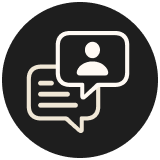While working on projects here at Studio, we almost always engage in some form of user interviews. As we’ve explained in our post, “How to make something people want” – conducting user interviews is one of the most fundamentally sound ways to reduce the risk of building a product and by extension, launching your company. We’ve previously shared some of our recommendations and steps on how to conduct your user interviews, but we also felt that it was important to explain some of why user interviews are so important for your early stage company, in greater detail.
Conducting user interviews can validate your concept
User interviews, either formal or informal, are one of the first steps a founder or a product leader can take to validate their product concept. It’s the combination of validating your business idea and determining your market size that should lay the groundwork in the foundation of any venture pitches you’re doing. Of course, as we’ve mentioned before – validation must be honest. You need to validate your product in conversations with your actual potential customers, no proxies or friends and family allowed. They can help to start, but at the end of the day, you’ll need to go right to the source by conducting user interviews.
Understand your users
While validating your idea is of leading value, actually just learning more about your user in general is almost always the next most important benefit of conducting user interviews. We have a predisposition to becoming too laser focused on our business, product and the problem it is intending to solve for our users. A key part of knowing how to conduct user interviews is making sure they lead you to lines of questioning, and open-ended learning that helps you understand much more about your audience. Their other problems, their priorities, their current behaviors. These findings in user interviews can be just as critical when it comes to understanding how your product needs to change, in order to find sales or product market fit.
Fill key holes in your institutional knowledge
At the onset of a project an idea for a product can be loose, and a few levels removed from all of the details and minutiae that may actually need to be present to fully understand the shape a particular solution needs to take. When conducting user interviews, you have the potential to observe or go into the practical specifics and round out your institutional knowledge about ‘how things work’ or are done currently. You can perform this by shadowing, or observing users in their environments, sometimes better than just asking them to tell you ‘everything they know about something’.
User interviews let you avoid the ‘friends and family’ effect
As briefly mentioned above, one of the most important reasons your early stage company needs to know how to conduct user interviews is to break, as early as possible, the confidence in parted by all of those who ‘want you to succeed’. While hopefully you can keep that motivation in your heart, it must be removed from the reality of attempting to answer the questions, ‘do people want this, is it a business, am I making something someone will buy or use’. In this, your friends and family are (often) oppositional. Your user interviews will help you, if conducted correctly, to establish truth.
Find hidden competitors
Your interviews will also often help you to understand your market better than you might have originally. Through the course of conducting user interviews in which you observe and discuss how your users solve their problems currently, you’ll suss out hidden competitors that your solution will need to prepare for. This might be other companies in the market you hadn’t known about, or it might be more loose than that. Maybe adjacent products that had your solution as a feature in a ‘solved well enough’ format, but that also solved 10 other problems for the user. Or it may instead be a non-product solution that is your competition as well, and you’ll need to sell against the ‘way something’s always been done’ that feels good enough.
Conduct user interviews to establish priority of competing features and user interest
During your interviews, correctly framing questions that point toward certain user features or problems will potentially give you the opportunity to assist in prioritizing competing new features on your roadmap. If one feature is identified by everyone you interview as critical, while another is only mentioned in one conversation, this should help you manage your backlog. You can even do this quantitatively, by asking users to stack rank or assign values for certain features.
Ensure design and engineering work isn’t wasted
One other benefit of conducting user interviews is the assurance that more design and engineering work isn’t wasted on the building of features that aren’t correct for your product or user. Performing usability interviews or validation style interviews both can lead you to the discovery that something you thought you’d needed potentially isn’t correct, isn’t designed or presented correctly, or isn’t important. In all of these situations, finding out in a conversation before you begin engineering implementation is a staggering savings of your runway and time. This, sometimes more than anything else, is a benefit to performing user interviews that can save your company. Nothing is more detrimental to an early stage startup than spending precious resources going down roads that lead nowhere.
Confirm usability and product design choices
In usability testing interviews, wherein you directly observe an interviewee interacting with your product or a design of your product, you can approach your user interviews with more strict measures and goals. “Can a user perform this task? When asked to, where do they click first? Do they misclick in attempting to perform the task? How long did it take them to perform the task?” By conducting user interviews to get this data, the resultant outcomes support the goal of confirming your usability and design choices, not just confirming if your product is a fit for the user in the first place.
How to conduct user interviews as a step in the sales process
User interviews should always be conducted with the goal of learning from the user first and foremost, however in an early stage company you may also be creating relationships with interested users. This isn’t something to ignore or waste. When you offer a solution to a problem they have, and they feel a participant in creating the ‘exact thing they need’ – you’ve created a sales potential relationship wherein hopefully someone might eventually become an actual customer. The brave might even be able to create a pre-sale opportunity coming out of the user interview, where someone confirms or contracts that they’ll purchase the product ‘when it’s ready’.
Perform user interviews not once, but as often as you can
While it may seem like the labor of conducting user interviews is cumbersome enough that you perform the process at key steps during your early stage lifecycle to validate, and then be done with it – this is most definitely not the case. In order to maximize the risk mitigation that user interviews provide, you should work toward creating an interview and research process that is embedded often, at the appropriate steps in your product development lifecycle. Doing this will ensure you don’t rest on your laurels and keep learning, which in turn will keep your risks lower.
When can you skip user interviews
While we almost always find one of the benefits listed above to be worth conducting user interviews for, there are the occasional situations where interviews can be skipped. Sometimes what you need to validate for your business is a metric at scale, more so than as much detail as possible. Perhaps for fundraising or pitching, for example. There can be times where the speed of execution lends itself more to ‘throwing up a landing page and sending traffic to it’ instead of a concentrated discussion with a potential user. We help our partners recognize this and make sure the right method of validation is used.
You always need what user interviews provide
We’re confident enough that given the lengthy list of benefits that conducting user interviews provide, we can almost always recommend they’re performed as part of a product design and development process. From validating your concept, to learning and observing, to improving your product and design, user interviews fundamentally reduce the risk of bringing a new product to market in early stages. For this reason, we ensure our teams have access to experts in formatting and leading user research to capture as many of the benefits above as possible. If you’re launching an early stage company and need support in learning how to conduct your user interviews program, contact Studio now.

